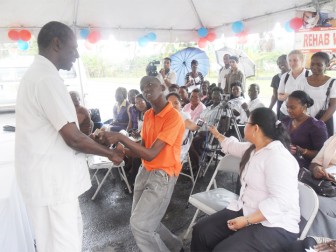Sixteen-year-old Foster Hunt Piqué is living proof that being physically challenged does not mean being handicapped and he was honoured yesterday at the launch of this year’s Rehabilitation Week in Linden.
As part of the observances of Rehabilitation Week, focus is being placed on ‘Early ID’—a process which has worked much to the benefit of several persons. According to Superintendent of Physiotherapy at the Linden Hospital Complex (LHC) Gloria Garraway, the Early ID process resulted in the success of Piqué, whose condition was identified when he was the tender age of two.

Determined to prove that he could lead a normal life, the medical team kept a close relationship with his mother, taking him through a strict programme of physiotherapy. “When he attained the age to be enrolled into school, we encouraged his mother not to deprive him of an education because there was nothing that was wrong with him mentally,” she said.
While the team was impressed with his growth and held the view that he should be enrolled in the public school system, they were struck by the news that the nursery school had refused to accept him.
It took Garraway’s intervention for Piqué to be accepted, making him the first extremely physically challenged child to be accepted into the public school system in Guyana. Piqué went on to the primary school, wrote the common entrance examination and gained a place at the Wismar Christianburg Secondary. “For every form he entered, he was among the top in the class and that was among the so-called normal children,” Garraway stated.
This year he wrote seven subjects at the Caribbean Secondary Education Certificate examinations and he is expected to come out successful.
Piqué was honoured by the LHC yesterday as his story was shared with a small group of persons attached the Ministry of Health, the LHC’s Administrative and Rehabilitation Unit staff, among special invitees at the launch.
Garraway said that unlike other parts of Guyana, schools in Linden have been accepting children who are physically challenged and she reported that in most cases these children excel and have been fitting in as other children.
Meanwhile, speaking at the launch, head of the Audiology Services of the Ministry Dr Ruth Quaicoe alluded to the many challenges the department has experienced over the years. “We have crossed many hurdles over the year since the department started in 1998 at the One Mile Health Centre,” she said. She noted that the challenges attest to the fact that while many persons utilise the services offered by the institution, many others are yet to learn of and access them. Cognisant of this, she said they have launched the early identification programme. Through this programme persons would be screened from birth to three years (the period set as Early ID).
While the progress may have outweighed their challenges, Rehabilitation Assistant Quacy Paddy said that the lack of a soundproof room limits the extent of their audiology services. “A lot of times when persons come to the hospital, because of the location the department was placed in this new hospital, the external sounds affect us heavily,” said Paddy.
The Linden unit operates out of two locations: the Upper Demerara Hospital and the Linden Hospital Complex. Patients are usually referred to Georgetown in the event of serious cases. Audiology, physiotherapy, occupational and speech therapy are combined in one department without the service of a cooling device. “Sometimes patients come and they have to use lots of heat in their therapy and that affects them a lot so we have to get the cooling unit. Other than that, we are a department that does our best with what we have until we get better,” Paddy said.
Among others present at the launch were Chief Executive Officer of LHC Gordon Gumbs, Administrator Trevor Vangendren, and Regional Vice-Chairman Samuel Hooper. Hooper challenged the Ministry of Health to include in its programme, rehabilitation for persons, and especially youths, who would have brought on some form of impairment on themselves by the use of illicit drugs. It was a challenge that Dr Quaicoe said is worth the investment.





